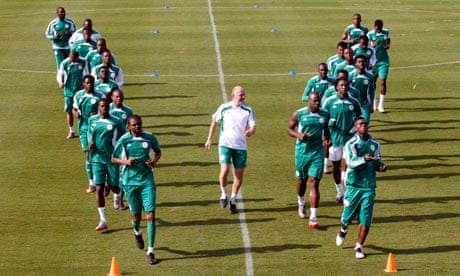On a humid Lagos night in July 1996, my family gathered around the television, all of us armed with hope: Nigeria was playing Argentina in the final game of the Atlanta Olympics. We shouted – "Go now, go go!" "What is he doing?" "Look at this stupid boy!"– and fell silent, by turns; we hoped and despaired; and we threw Igbo and English insults at the bald referee who we were convinced was biased against Nigeria.
The score was 3-2 for Nigeria and there were a few minutes left to go and I could no longer breathe properly. I wanted to fast-forward time, to leap into our victory because I feared that the longer we waited, the less likely it would come. But it came. The shrill pee-pee-pee whistle went off. We had won gold.
I remember feeling very light, hugging everyone, laughing, repeating the same things that somebody else had just said. We hugged neighbours we did not like. We offered drinks and relived the game over and over. From the streets came the sounds of car horns, of shouting, of singing.
What happened that night was an explosion of nationalism of a certain kind, a benign, forgiving, optimistic nationalism. We forgot about neighbours who stole our electricity wires and leaders who stole our oil money. We all became, for that moment, Nigerians who had contributed to the vanquishing of the world.
Still, football nationalism, for many of us, often expands past Nigeria, and into the rest of Africa. I do not ordinarily much care for football or for excessive nationalism, but whenever Nigeria plays a major game, I find myself undergoing a transformation. I kick the air as I watch. I scream. I pray. I will the universe to make us win.
And the idea of an ''us'', a collective identity, becomes unquestionable. Sometimes the boundary of this identity widens, as it did during the 2006 World Cup when Nigeria did not qualify. And so, for one intense day while Ghana played the United States, I became Ghanaian. I watched with my Nigerian best friend Uju, hugging each other and dancing when Ghana finally won. "Some of our boys started playing this game without shoes," Uju said proudly. "Our boys" were, of course, the Ghanaians.
Thankfully, Nigeria qualified for this year's tournament. , I will watch the Nigeria-Argentina match with that cautious optimism that is the default position of many Nigerians about our national team. (Our boys are good, we like to say, but the management and organisation of our team is terrible.)
I would be thrilled if we win all our matches but I would not despair if we don't, because I would then aim my hope, borne of an expanded nationalism, at our other boys, from Ghana, Ivory Coast, Cameroon and South Africa.
Football nationalism is not particular to Nigerians or Africans, indeed the idea of national games is based on the premise of national identities, but perhaps what is different about sub-Saharan Africa is that football victory presents a rare chance to feel an unadulterated pride. The scrappy nature of this pride makes it remarkable.
Our football nationalism, then, symbolises a cathartic, even if fleeting, addressing of historical and political grievances. It is a platform on which to stand and say that we may not be part of the G8 who decide the fate of the world, we may always rank on the bottom of health and government and economic indexes, we may have crumbling institutions and infrastructure, but hey, we won by sheer talent and grit. And a lot of the boys started playing without shoes.
Now imagine what we could do if we all had shoes – literal and metaphorical – from the beginning.
